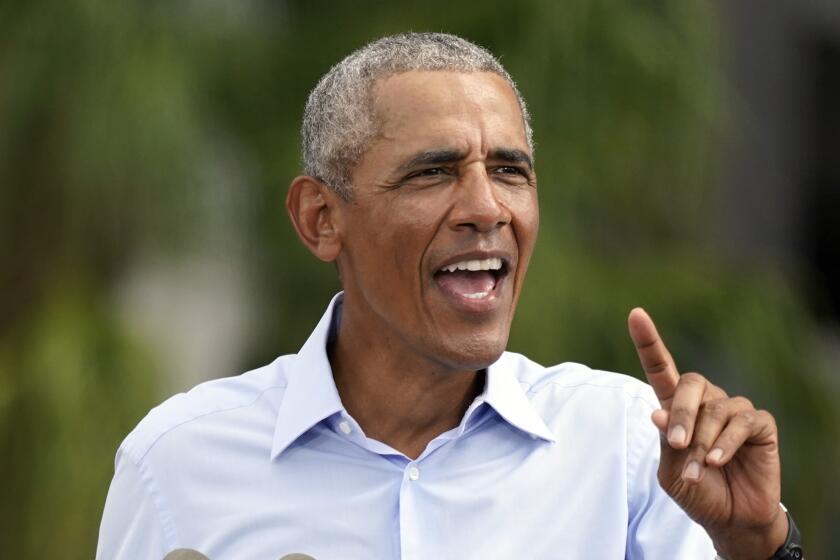Column: Biden’s secret weapon: Anti-Trump Republicans

- Share via
WASHINGTON — If Joe Biden wins the presidency this week, he could owe part of his victory to a small but surprising constituency: disaffected Republicans who abandoned President Trump.
The vast majority of Republicans are voting for Trump, of course. A Pew Research Center survey in October indicated that 92% of Republicans planned to vote for Trump — a healthy level, even if it’s not as high as the president claims.
But trouble lurks beneath that number.
For more than three years, Obama didn’t respond to Trump’s attacks, honoring the norm that former presidents don’t criticize successors. But no more.
Republican ranks have shrunk this year. In January, more Americans said they were Republicans or Republican-leaning than Democrats or Democratic-leaning — 47% to 45%, according to a Gallup poll.
Now the Democrats hold the advantage, 49% to 45%, Gallup has found.
Moreover, Biden appears to draw more support from dissident Republicans than Trump gets from renegade Democrats.
In the Pew poll, 6% of Republicans said they would vote for Biden; only 3% of Democrats planned to vote for Trump. Other surveys have found similar results.
The polls reflect Trump’s odd political strategy. Instead of trying to expand the coalition that supports him, he has focused on bolstering his relatively narrow base of conservatives, white evangelicals and men without a college degree.
Along the way, he has alienated suburban women, college-educated voters in both parties, young people and — thanks to his chaotic response to the pandemic — older voters.
To that list add a growing group of disaffected Republicans, some of whom came out of the “Never Trump” movement in the 2016 campaign.
This year, they formed Republican Voters Against Trump and asked other Republicans to submit video testimonials that could be used for TV ads, billboards and other campaign material. They got more than 1,000 videos in response.
One came from Tommy Stallings, a plain-spoken 43-year-old real estate broker in Lubbock, Texas.
“I’ve been a Republican my whole life,” Stallings told me. “I still believe in small government, the 2nd Amendment and individual liberty. I voted for Trump in 2016. But I can’t vote for him a second time.”
He said he lost confidence in the president after former senior Trump aides described chaos in the White House.
“When people like Mattis and Kelly left and said, ‘This guy is crazy,’ that did it for me,” Stallings explained, referring to former Defense Secretary James N. Mattis and former White House Chief of Staff John F. Kelly.
Monica Rey Haft, a 51-year-old lawyer in Richardson, Texas, sent a video, too.
“I’m a lifelong Republican,” she told me. “Pro-life. Evangelical.”
“I voted for Trump with misgivings,” she said. “I believed once he felt the weight of the office, he’d knock off the bluster and the silliness. But he didn’t, and I think it’s cost the country a lot.”
“My mother says I’ve lost my mind,” she added.
Jerry Copan, a 69-year-old retired trade association executive in Raleigh, N.C., had similar sentiments.
“It’s about character and competence,” he said. “I think he’s shown a complete failure of leadership when it comes to COVID.”
Copan allowed Republican Voters Against Trump to use his name and photograph on a highway billboard in his state.
“I’ve taken a fair amount of grief for that from my golf group,” he said.
The idea behind the advertising campaign is that Republicans in conservative areas may hesitate to break with the president unless they hear an anti-Trump message from real people who sound like them.
“Republicans often face a lot of social pressure to vote for Trump,” Sarah Longwell, a veteran Republican activist who runs the group, told me. “We wanted to create a permission structure — an offramp for people who voted for Trump four years ago.”
Other dissident GOP groups have campaigned against Trump, most prominently the Lincoln Project, which has produced a series of stinging videos ridiculing the president.
But political strategists question whether the Lincoln Project’s ads, which are vastly entertaining for anti-Trump Democrats, are likely to induce wavering Republicans to bolt.
“We spent a lot of time in focus groups [of GOP voters] and found that stuff that hammered the president wasn’t very persuasive,” Longwell told me. “There’s a lot of distrust out there. We had to figure out who the right messenger would be. The answer was other Republicans.”
The Biden campaign has enlisted some prominent Republican voices, too.
Former Ohio Gov. John Kasich and former Secretary of State Colin Powell endorsed Biden at the Democratic National Convention. Cindy McCain, the widow of Arizona Sen. John McCain, is the subject of a Biden commercial shown in her home state.
There’s no comparable cross-party campaign on the Trump side to woo Democrats — unless you count the president’s appeals to blue-collar workers.
The most prominent Democrat to endorse Trump is former Illinois Gov. Rod Blagojevich, who in 2011 was sentenced to 14 years in prison for corruption. After Trump commuted his sentence this year, Blagojevich dubbed himself a “Trumpocrat.”
Will the outreach matter? It’s impossible to know in a campaign that has bombarded swing state voters with more ads, in more media, at greater cost than ever before.
But it may not take much to swing a close election. A few disaffected Republicans could be enough to make the difference.
More to Read
Get the L.A. Times Politics newsletter
Deeply reported insights into legislation, politics and policy from Sacramento, Washington and beyond. In your inbox three times per week.
You may occasionally receive promotional content from the Los Angeles Times.












